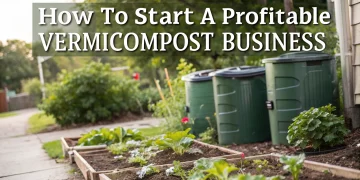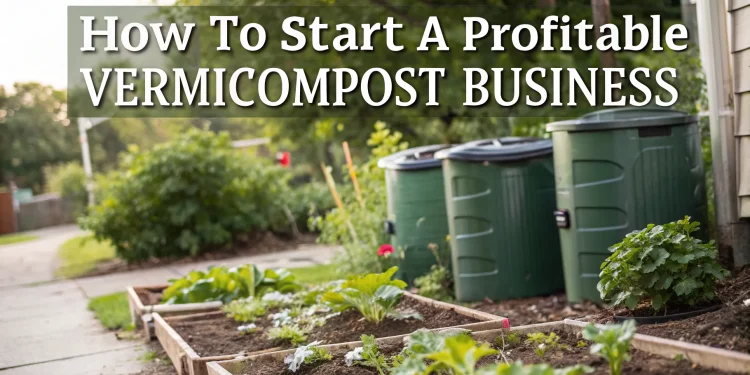An Eco-Friendly Business Opportunity for Agricultural and Industrial Entrepreneurs
Vermicomposting has become a powerful and profitable green business for entrepreneurs as the world agricultural sector increasingly shifts towards sustaining organic and eco-friendly practices. Entrepreneurs now have a market-friendly and eco-conscious opportunity with the increasing need for organic agricultural products, natural fertilizers, and soil restoration methodologies.
A vermicompost business can be initiated with simple and basic technology along with a well-calibrated business plan, market understanding, and operational management. This guide provides a comprehensive understanding of the industry requirements, market and operational insights, and the entrepreneurial landscape, along with growth and demand potential.
Why a Vermi Composting Business Is a Smart Move
Vermicomposting further enhances organic farming’s adoption by farmers as awareness towards climate change, soil health, and food security increases across the globe. The once highly valued chemical fertilizers have come under scrutiny due to their environmental and health impacts. This shift in the agricultural sector’s focus towards organic farming has led to the phenomenal growth of vermicompost, which is now viewed as a top-tier organic compost solution.
Vermicomposting enhances the soil quality, healing the soil with beneficial microorganisms, improving its aeration, optimizing moisture retention, and nourishing plants holistically. From the perspective of nurseries and farmers, it boosts crop yields. From the viewpoint of waste management authorities, it serves as a more environmentally sound alternative to landfilling waste.
As an entrepreneur in organic fertilizers, you are not simply starting a venture. You are entering a business opportunity that integrates agriculture, waste recycling, climate action, and sustainable development.
Related: How to Start a Profitable Vermicompost Business
Understanding the Market: Demand, Forecast & Sector Growth
India’s Organic Push and Global Fertility Crisis
Each year in India, more than 350 million tonnes of organic waste are generated, and a majority of it is either mismanaged or underutilized. Luckily, with both private and public initiatives to promote more organic farming, it is easier to access funding sources such as the PKVY and organic input subsidies. This, along with initiatives such as organic compost and vermicompost, is expected to drastically increase.
Between the years 2024 and 2030, the organic fertilizer market is anticipated to grow at a compound annual growth rate of over 11% globally. The acceleration in growth in India is attributed to the increased shift in consumer preferences towards purchasing more chemical-free foods, the decline in soil health, and increased backing by agritech startups focusing on small and marginal farmers.
Growth in Rural and Urban Regions
Vermicomposting is gaining popularity outside the confines of traditional farmlands. Now, it includes households in urban areas, as well as pancake gardeners, and even landscape contractors. Moreover, golf courses and large residential communities have also started utilizing organic compost. This shift and the broadening of the customer base are, undoubtedly, a boon in the business and aid entrepreneurs in reaching diverse markets for retail, institutional, wholesale, and even online.
Vermi compost accounts for an even greater surge in organic compost demand in other regions, as it has a more potent nutrient profile, a fast decomposition rate, and better results. This is also the case for the domestic market, with estimates crossing over 20 million metric tons of demand by 2030.

Step-by-Step Overview of the Vermi Compost Manufacturing Process
Vermi composting is simple in concept, as the process involves earthworms converting bio-waste into compost. However, running it as a business entails consistent hygiene, structured production, and profitability, requiring a more complex system.
1. Raw Material Preparation
The process begins with the raw collection of materials, which is a collection of agrowaste, cow dung, and even discarded vegetables from the market. Moreover, the earthworm composting process also includes the residues from the farm. They are also pre-composted for 10 to 15 days, which partially decomposes these materials to better the process and avoid heat and gases harmful to the earthworms.
2. Bed Formation or Pit Method
Decomposed materials are arranged into windrows or shallow pits. Organic waste layered between compressed coco peat or part decomposed dung creates a micro-environment for earthworm digestion.
3. Worm Inoculation
Specific species of earthworms, such as Eisenia fetida or Eudrilus eugeniae, are added to the prepared beds. These organisms consume the organic waste and convert it into nutrient-dense casting,s which form the vermi compost.
4. Maintenance And Monitoring
Monitoring pest infestations, worm and bed temperature, along with the refill of oxygen by gentle turning of the beds, helps make sure the temperature, moisture, and even aeration is optimal.
5. Harvesting The Compost And Worm Separation
The compost is described to be dark brown, odorless, and granular. After the 45-60 day period, the compost is to be harvested; during this period, the worms would have reused the surface compost.
6. Screening and Packaging
Residual and lump waste compost is sifted and packaged into moisture-resistant HDPE and jute bags. Appropriate labeling, batch marking, and adherence to organic certification terms strengthen the market as well as competitive brand image.
Related: Setting Up a Successful Vermiculture and Vermicompost Business
Key Success Factors for Entrepreneurs
A successful and profitable vermicompost business goes beyond waste decomposition. It requires thorough knowledge of inputs, end users, and brand image within the industry competition.
A successful vermicompost business sustains strategic linkages with organic farmers, retail gardening outlets, agri-input dealers, and even municipal corporations. To maintain quality, they incorporate microbial testing and follow standard operating procedures for waste sourcing, composting, and packaging.
This is where branding plays an underrated yet crucial role. Startups advocating the advantages of vermicompost—compared to traditional fertilizers— and telling the story of how it positively impacts the environment tend to gain and retain user trust.
An equally smart approach is product diversification. With the core operation of vermicompost, many expand by offering liquid fertilizer (vermi wash), earthworm cultures, and compost kits, multiple revenue streams.
Compliance and Certification Issues
To effectively position your product in the domestic and global organic markets, compliance to organic certification standards is important. In India, organic certification is mandatory under NPOP (National Program for Organic Production) or FCO (Fertilizer Control Order) to market vermi compost as an organic input.
Vermi compost manufacturers must also perform periodic microbial analysis and pH testing to uphold product quality, improve brand trust, and fulfill buyer requirements. Registering with agricultural, pollution control, and agro-input boards can provide eligibility for government schemes and access to B2B clients.
Social and Environmental Issues
The vermi composting business is well aligned with the sustainability initiatives of India. The process of composting food waste does a great deal in mitigating solid waste management in urban centers where food waste is a significant problem. Biodegradable waste recycling mitigates methane emissions, reduces landfill dependence, and restores soil.
Socially, vermi composting can initiate income opportunities for rural and peri-urban females, youth, and farming communities. Many self-help groups have formed successful composting units and transitioned into large businesses or cooperative ventures.
For more information, watch this video
Conclusion: Building a Simple Yet Impactful Green Business for the Future
The vermicomposting business is not just a manufacturing process; it is a growing and responsible business venture that can expand both socially and economically. There is a distinct edge for entrepreneurs venturing in this niche as it lies at the confluence of farming, waste management, and eco-friendliness.
As the market for organic farming in India is expected to grow rapidly, and the pressure on governments to encourage organic inputs increases, vermicomposting will continue to be a vital practice in soil health management and climate-smart agriculture.
Whether you are a rural beginner, an urban sustainability-focused entrepreneur, or an agro-based industrialist, this venture has a lot to offer, provided it is established with clear technology, maintained farming standards, unwavering quality, and strong industry linkages.
Which business to start? How to choose a business idea?
About NIIR Project Consultancy Services (NPCS)
NIIR Project Consultancy Services (NPCS) prepares Market Survey cum Detailed Techno Economic Feasibility Reports for entrepreneurs exploring new industrial setups. Their reports include complete details such as manufacturing process, raw materials, plant layout, and financials. NPCS helps startups and business owners assess the viability and profitability of launching a new venture with technical and market-backed clarity.


















